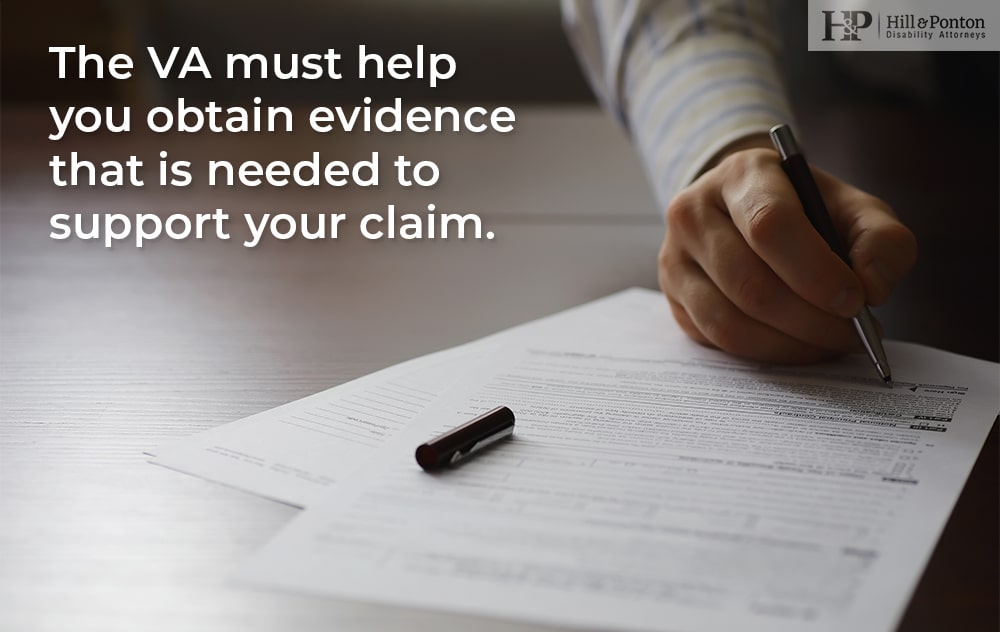The VA benefits claims system is unique because it is supposed to be a “non-adversarial” process. In theory, this means that the VA is required to work with you, not against you. Unfortunately, this is not always the case.
Too many times, however, we find that the VA has not satisfied its responsibility to help veterans with their cases. It can be a mistake to rely solely on the VA’s assistance to develop your claim.
The VA’s Duties to Assist & Notify
The VA is required to notify a veteran of the information that is needed in order to obtain the benefits requested. This called the VA’s duty to notify.
Also, the VA is required to obtain information, and evidence that would support a veteran’s claim such as service records, service medical records, etc. This is called the VA’s duty to assist.
The purpose of these duties is to make it easier on the veteran claiming benefits to gather all of the necessary evidence for a successful claim. We’re breaking down these functions in more detail below.

Duty to Notify
When a veteran makes a claim for disability benefits, the VA needs to inform them of any information and evidence that will help their claim be successful. This means the VA must explain what evidence they require you to obtain on your own, and likewise, what evidence the VA will obtain on their own.
If the VA determines that a claim is not complete enough to be processed, they then have a duty to notify you what is needed in order for that claim to become complete. On the other hand, if the VA determines that a claim is complete enough to process, they then must notify you of what information would be helpful to support your claim.
For example, if a veteran told his mother during service that he had injured his back, the VA should notify the veteran that a statement from his mother about that conversation would be helpful in substantiating his claim.
Duty to Assist
Once the Regional Office (RO) has received your claim and determines that your claim is reasonable, the VA must help you obtain evidence that is needed to support your claim. The VA must make reasonable efforts to obtain military service records without you having to request them to do so.

The VA’s duty to assist in gathering records arises from the simple fact that the government is often in a much better position to obtain certain evidence than is the veteran. For instance, the government has knowledge about the whereabouts of certain records and has access to records that many veterans may not know how to obtain on their own.
That is not to say that veterans should not make the attempt to get their own records—we often use private researchers to obtain such records with great success.
Also, the VA must assist you in obtaining records from private doctors or hospitals upon your request. However, it is important to know that should the VA determine evidence doesn’t exist, they have no duty to continue trying to obtain it.
That is why it is still important for the veteran to work with their representative to gather all medical records, reports, statements, etc. that would help substantiate their claim; you should never rely solely on the VA to develop evidence needed to substantiate your claim.
What Veterans Can Do
While the VA is required to help veterans in obtaining their personnel and service medical records, all too often we see claims files where the VA either did not even bother to request the complete records or did not put forth the best efforts in following up on those records.
Ultimately, it is the veteran, and not the VA, who is hurt if his or her records are not found.

It is very important to make sure that the VA has all of the necessary information so that VA can make the appropriate requests.
The veteran should provide the VA with all of the information he has available about his time and place of service as well as the in-service circumstances leading to the veteran’s disability. The VA may use a veteran’s failure to provide such information as an excuse for not assisting that veteran any further with his or her claim.
Again, however, it is not always a good idea to rely solely on the VA to provide supportive medical evidence. We find that veterans often obtain better results when they are able to provide the VA with medical opinions from private doctors rather than relying on the medical opinions that the VA provides.
We are able to have the Court of Appeals for Veterans Claims overturn many of the VA’s decisions based on the VA’s failure to properly assist veterans. You can save yourself the time and aggravation of an appeal to the Court, however, by making sure that the proper evidence gets into your claims file in the first place—with or without the VA’s assistance.
Have Questions About Your Claim?
The team at Hill & Ponton is here to support you in your claim for benefits. Contact us today for a free case evaluation.

